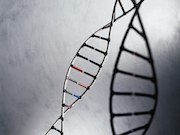Six rare mutations identified in seven subjects that would not have been uncovered without sequencing
TUESDAY, Dec. 12, 2017 (HealthDay News) — SERPINA1 DNA sequencing can identify alpha-1 antitrypsin deficiency (AATD), according to research published online Nov. 28 in the Annals of the American Thoracic Society.
Noting that diagnostic methods for AATD usually follow a multi-step testing algorithm, François Maltais, M.D., from the Université Laval in Québec City, and colleagues reported their clinical experience with DNA sequencing in the investigation of AATD. DNA sequencing of the coding regions of SERPINA1 was performed by Sanger sequencing and applied in 65 consecutive individuals.
The researchers identified six rare mutations in seven individuals (10.7 percent) that would not have been uncovered without DNA sequencing. The rare NullMattawa mutation was identified in two subjects. Five of the six mutations resulted in a deficient allele and one was considered a normal variant. Compared with individuals with Z or S alleles, the patients with a mutation were numerically younger, had a more severe deficit in alpha-1 antitrypsin level, and a lower post-bronchodilator forced expiratory volume in one second; no statistical inference was made from this comparison. In seven subjects, serum levels of alpha-1 antitrypsin alone were misleading.
“The current era of genomic medicine makes it possible to extend the diagnosis of AATD beyond the most common deficient alleles and to identify the underlying genetic abnormalities in more patients,” the authors write.
Copyright © 2017 HealthDay. All rights reserved.








